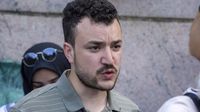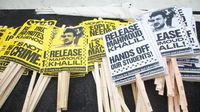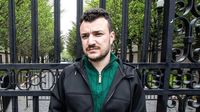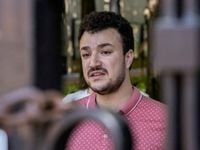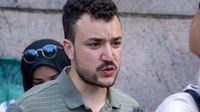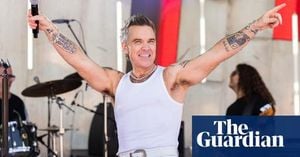On April 11, 2025, an immigration judge in Louisiana ruled that Mahmoud Khalil, a graduate student at Columbia University, can be deported from the United States as a national security risk. This decision follows his involvement in pro-Palestinian demonstrations, which the Trump administration has labeled as potentially harmful to U.S. foreign policy.
Immigration Judge Jamee E. Comans stated that the government had established by "clear and convincing evidence" that Khalil is removable from the U.S. The ruling comes amidst rising tensions surrounding free speech and immigration laws, particularly for those involved in activism related to the Israeli-Palestinian conflict.
Khalil, a 30-year-old legal U.S. resident originally from a Palestinian refugee camp in Syria, was detained on March 8, 2025, by federal immigration agents in the lobby of his university-owned apartment. His arrest marked the first under President Trump's intensified crackdown on students participating in protests against the war in Gaza. Following his detention, Khalil was transferred to an immigration detention center in Jena, Louisiana, far from his family and legal counsel.
During the hearing, Khalil's attorney, Marc Van Der Hout, expressed grave concerns about the fairness of the proceedings, stating, "Today, we saw our worst fears play out: Mahmoud was subject to a charade of due process, a flagrant violation of his right to a fair hearing, and a weaponization of immigration law to suppress dissent." Khalil himself remarked on the importance of due process, saying, "Clearly what we witnessed today, neither of these principles were present today or in this whole process."
The U.S. government, led by Secretary of State Marco Rubio, has invoked a rarely used provision of immigration law that allows for the deportation of non-citizens deemed to pose "potentially serious adverse foreign policy consequences" for the United States. Rubio's justification for Khalil's deportation included claims that his participation in protests fostered a hostile environment for Jewish students in the U.S., although no criminal charges have been filed against him.
Despite not being accused of breaking any laws during the protests, the administration has suggested that Khalil's views, which they consider to be antisemitic and aligned with Hamas, warrant his removal. Khalil's supporters argue that he has merely exercised his First Amendment rights by advocating for Palestinian rights and criticizing American foreign policy.
In a letter submitted to the court, Rubio stated that Khalil's activities "foster a hostile environment for Jewish students in the United States," yet did not provide evidence of any illegal conduct. Khalil's legal team has maintained that the government's actions are a direct attack on free speech and political expression, particularly for those advocating for Palestinian rights.
The ruling has sparked significant backlash, with rights advocates accusing the Trump administration of suppressing dissent under the guise of fighting antisemitism. Khalil's detention has also drawn attention to a broader crackdown on activists and critics of Israeli policies on college campuses across the nation.
In a separate federal case in New Jersey, a judge has temporarily blocked Khalil's deportation while considering claims that his arrest violated his constitutional rights. This legal battle underscores the complexities of immigration law and the intersection of free speech rights in the context of political activism.
As Khalil's legal team prepares to appeal the ruling, they have until April 23, 2025, to file their application for relief. The case highlights ongoing debates about the limits of free speech, particularly in politically charged environments, and raises questions about the implications for other activists who may find themselves in similar situations.
Khalil's wife, Noor Abdalla, who is eight months pregnant, has expressed her distress over the situation, stating, "No person should be deemed removable from their home for speaking out against the killing of Palestinian families, doctors, and journalists." Khalil himself has described his experience in detention as that of a "political prisoner," raising concerns about the conditions and treatment of individuals held under similar circumstances.
The Trump administration's stance on Khalil's deportation reflects a broader trend of targeting activists and dissenters, particularly those involved in movements advocating for Palestinian rights. As the legal proceedings continue, the outcomes could set significant precedents for how immigration law is applied in cases involving political speech and activism.
As Khalil's case unfolds, it remains to be seen how the courts will balance national security concerns with constitutional protections for free speech. The implications of this ruling extend beyond Khalil himself, potentially impacting the rights of numerous activists and shaping the future landscape of political discourse in the United States.

